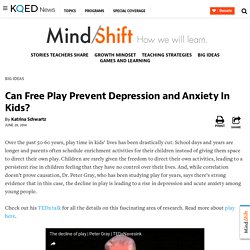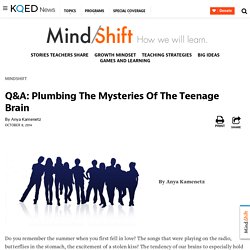

Can Free Play Prevent Depression and Anxiety In Kids? Over the past 50-60 years, play time in kids’ lives has been drastically cut.

School days and years are longer and parents often schedule enrichment activities for their children instead of giving them space to direct their own play. Children are rarely given the freedom to direct their own activities, leading to a persistent rise in children feeling that they have no control over their lives. And, while correlation doesn’t prove causation, Dr. Peter Gray, who has been studying play for years, says there’s strong evidence that in this case, the decline in play is leading to a rise in depression and acute anxiety among young people. Check out his TEDx talk for all the details on this fascinating area of research. Q&A: Plumbing The Mysteries Of The Teenage Brain. By Anya Kamenetz Do you remember the summer when you first fell in love?

The songs that were playing on the radio, butterflies in the stomach, the excitement of a stolen kiss? The tendency of our brains to especially hold onto memories from the teenage years is called the “reminiscence bump.” Key Person & Attachment - Early Years Matters. The Key Person Children thrive from a base of loving and secure relationships. This is normally provided by a child’s parents but it can also be provided by a key person. A key person is a named member of staff with responsibilities for a small group of children who helps those children in the group feel safe and cared for. The role is an important one and an approach set out in the EYFS which is working successfully in settings and in Reception classes. It involves the key person in responding sensitively to children’s feelings and behaviours and meeting emotional needs by giving reassurance, such as when they are new to a setting or class, and supporting the child’s well-being.
Whole Child Development Is Undervalued. The question is how to make such an approach both systemic and sustainable. Whole Person Socio-emotional, physical, creative, and cognitive capacities are deeply intertwined and equally important in ensuring a child's wellbeing, learning, and growth.
(That shouldn't be a surprise to anyone studying or supporting children's learning.) Nobel laureate James Heckman, a professor of economics at the University of Chicago, has shown that the non-cognitive skills emerging in early childhood are among the strongest predictors of adult outcomes. And Paul Tough, author of How Children Succeed, has continued to emphasize the crucial role that soft skills play in character formation and building on persistence, curiosity, and even grit -- the "passion and perseverance for very long-term goals," according to psychologist Angela Lee Duckworth. The Re-imagine Learning Network.